In May of 2011, a team of 20-25 highly trained Special Forces troops landed in the middle of the night in a town outside Islamabad. They flew in undetected, and used their countless hours of training to take down the world’s most ruthless terrorist, Osama Bin Laden. They were SEALs, and the world finally got a close up view of what the most elite fighting team in the world could accomplish.
Even before that point, I became fascinated with Navy SEALs, and the rigors of SEAL training. Think about this statistic for a second. Only 15% of those trying to become SEALs actually make it through the training. That’s right, the training is so rigorous, so mentally tough, so physically extreme, that even the most athletic, strongest, and toughest trainees drop out.
That statistic is insane, but makes complete sense, when you think about what SEALs must do on a regular basis. They jump out of planes at 20K feet, with oxygen masks on, dropping in behind enemy lines, to complete dangerous missions to keep our country safe. They work in small, stealthy teams, and are called upon to tackle the most dangerous operations. Failure is truly not an option for SEALs.
Only 15% of Navy SEAL Trainees Make It Through SEAL Training
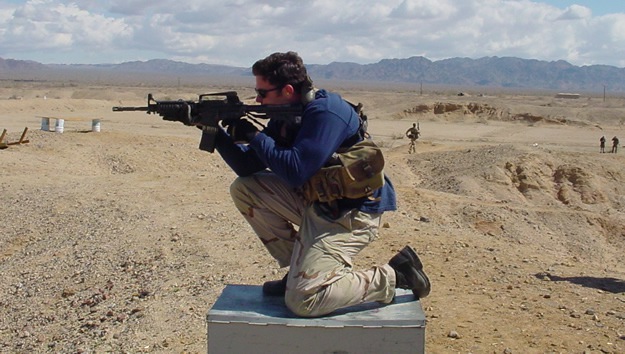
SEALs and SEO
So how do Navy SEALs apply to SEO? First, a quick disclaimer. I am by no means comparing what Navy SEALs do with what we do as marketers. I have the highest level of respect for every person in our military. What they do every day enables me to play with websites, keywords, and search engines. But, I think businesspeople and marketers can learn a lot from understanding how Special Operations teams work, how they think, and how they execute.
When writing my post about Large Scale SEO and Failure, I explained that complex SEO projects are not for the faint of heart. There are times you are fighting an SEO battle on several fronts, including branding, technology, designers, PR, the c-level suite, etc. And then you have external changes to deal with, like Google’s algorithm updates, new technology emerging, new channels, platforms, or even mediums. And then you have the competition, which sometimes doesn’t play by the rules (understatement of the year). It’s during these times that honesty and integrity are tested, and decisions are made that could make or break a business.
Want Real Answers? Ask a SEAL
All of this led me to wonder how a SEAL would tackle SEO, and handle the challenges we face every day as an industry. That’s when I decided to reach out to an actual SEAL to find out. It ends up my wife has a good friend she went to high school with who became a SEAL. I messaged him to see if he had any insights for me. He immediately said, “Glenn, I’ve got the person for you” and connected me with Dave Rutherford, a former Navy SEAL with an incredible background in Special Operations training and behavior.
Dave served as a SEAL for 8 years through 2003, and participated in clandestine missions in the Middle East, Southeast Asia, and Afghanistan. He has served with, and trained, many SEALs during his career. Dave also runs his own motivational consulting business, Froglogic Concepts, where he works with companies to help their internal teams work at the highest possible levels in any environment imaginable.
Dave was nice enough to work with me on this post and explain more about SEAL philosophy, training, and toughness. In addition, I was able to explain more to Dave about the SEO industry, the challenges we face, and the ever-changing external environment. Together we crafted this post. By the way, Dave also provided some of the amazing photos you’ll see throughout this post.
Dave Rutherford, Former Navy SEAL and President of FrogLogic Concepts
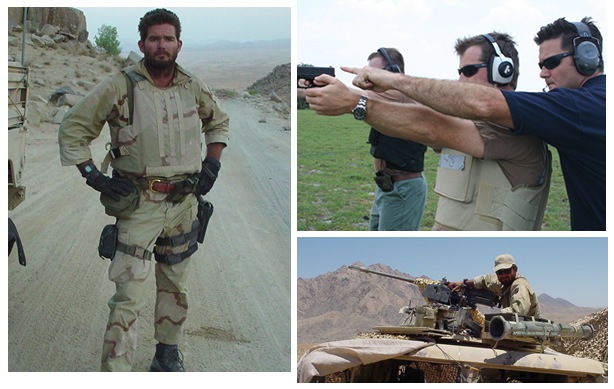
My hope is that you can take SEAL philosophy and apply it to what you do every day in SEO. I can tell you first-hand that I’ve already made changes since speaking with Dave. Below, I’ve broken down several core topics that apply to SEO, and asked Dave for his input as a SEAL. Then I provided context based on my experience working as a consultant, in-house marketer, and from my time at a large agency (during my 17 year career). Let’s dive in, no pun intended. 🙂
1. Continually Honing Your Skillset
Dave: I am constantly being asked what makes SEAL Teams so good at what they do. The misconception is that we possess top secret technology and equipment that makes operating in the most extreme environments on the planet easy. That couldn’t be further from the truth. What really makes us the best is that we train 1000 times harder than our enemy does. We practice the basics to perfection and then apply those Standard Operating Procedures (SOP’s) to the situation at hand. We maintain a flexible mindset grounded in sound tactics.
Glenn: In my opinion, you absolutely need a core SEO skillset to get basic projects completed, which includes a solid understanding of technical SEO, keyword research, content optimization, analytics, etc. But, the constant state of change in the industry leads to a need for continual learning. SEO has expanded beyond simply SEO, and now includes Conversion Rate Optimization, User Experience, Social Media Marketing, Content Development, Technical Development, Branding, etc. If you aren’t continually learning new areas of marketing as an SEO, while honing your skillset within those areas, then you’ll be left behind. Period.
SEALs Training While Under Pressure To Master Key Skills
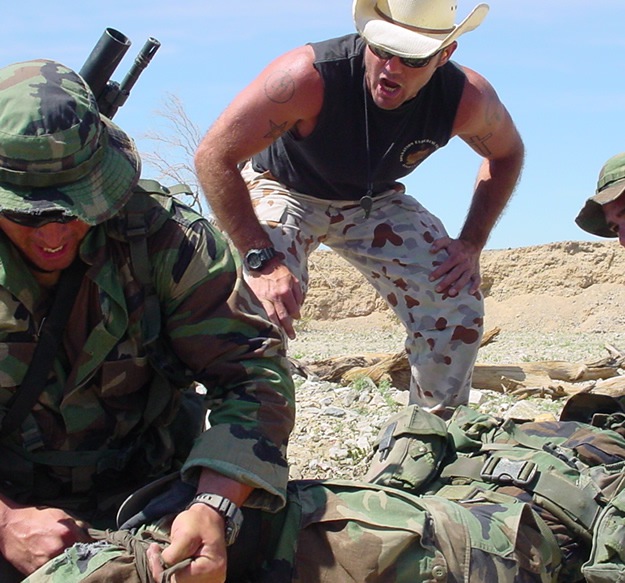
In addition, new functionality and tools are released every week in this industry, and it’s up to you as an SEO to test them out, learn the right tools, and apply them to your current projects. I dedicate time every week to testing out new tools, applications, coding techniques, analytics packages, etc. To me, this is essential for any seasoned SEO. Like Dave said, train 1000 times harder than your enemy. Get the basics perfected, and be flexible when new technology or tools come out. Think like a SEAL.
2. Adapting to Change
Dave: Real-world operations almost never go exactly to plan. Murphy is always poised to make things as tough as possible for the good guys. There is no escaping the reality of the fog of war. However, because SEALs have logged thousands of hours training in every facet of our operational repertoire, and the fact that we always have a strong plan before we execute our objectives, we are mentally prepared for anything that should arise. The units that don’t prepare for realistic contingencies, and haven’t spent the countless hours honing their skill-set as a group, will be at a serious disadvantage right from the start.
Glenn: There are definitely some areas of SEO that are straight-forward, and that won’t throw many curveballs at you. For example, you need to perform keyword research, you need to optimize your content correctly, you need to provide a strong website structure, etc. But there are larger, more complicated SEO problems that aren’t as clear or straight-forward.
For example, think of the struggles that Panda victims must go through to diagnose, and then fix the issues at hand. What should they change? Should they gut content? Which content is “poor quality”? Was it even Panda that hit the site? How long will a recovery take? And will the site ever recover? How about mobile SEO, social signals as a ranking factor, the knowledge graph, etc?
A Flowchart I Used with a Company Hit by Panda: They Needed to Adapt to Recover
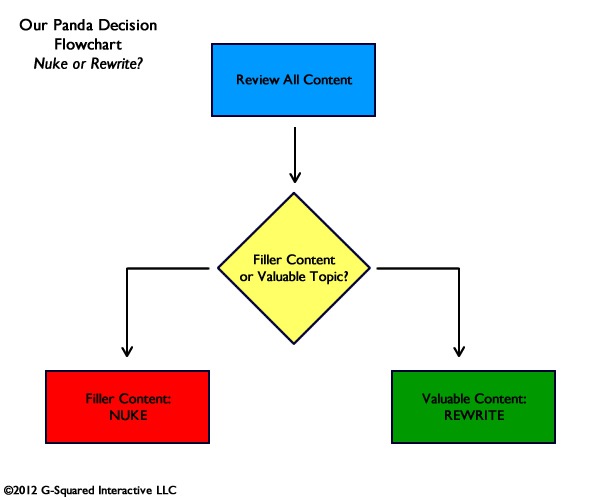
With more complex SEO projects, contingency plans are critically important. Not every project will go as planned, and you need to guide your clients down the best path possible, based on your experience and training. In addition, Google updates its algorithm over 500 times per year. Some are slight changes, while others are more extreme.
The line between Search and Social is blending more and more each day. Mobile is absolutely booming, and users are spread across various platforms, networks, and devices. As an SEO, if you don’t adapt to the external environment, you and your clients will not be as successful as you could be. And if you maintain that lack of flexibility, you will fail miserably. Like Dave said, be prepared for realistic contingencies. Don’t be at a disadvantage.
3. Maintaining High Integrity in the Face of Adversity
Dave: In BUD/S (Basic Underwater Demolition/SEAL) Training, you are constantly being evaluated to the point of mental exhaustion. Instructors are hovering like eagles waiting to pounce on their prey. If you aren’t totally prepared for each evolution with a heightened sense of attention to the details you will fail. This type of governance links accountability to integrity for the rest of your life, in and out of the SEAL Teams. If a teammate doesn’t have total confidence in you and your integrity, he can never trust you’ll be there when the tide of war flows against you. Your team must know that you will make the right decisions during a mission, and vice versa.
Glenn: Let’s face it, there are several core integrity issues that have been connected with the SEO industry for a long time. You have some people guaranteeing number one rankings in Google, you have others trying to take down companies with negative SEO, and you have all sorts of black hat tactics being applied to websites every day. Unfortunately, these things could end up crushing a website, which can end up killing a business. And with both Panda and Penguin on the loose, many people engaged in these actions have gotten hammered by Google since early 2011.
Severe SEO Situations Require Hard Decisions and Leadership

SEALs are trained to uphold the highest degree of integrity during the most extreme conditions. Doing what’s best for your team in order to accomplish your mission is the number one thing being considered by SEALs, even if that means dying to do so. As an SEO, you have to constantly be asking yourself if what you are recommending is the best thing for your clients and your team. The recommendations you provide should be for long-term success, and not short-term wins. Be transparent with your clients with what you are implementing, why you chose that path, and what the possible outcomes will be. Maintaining high integrity in all facets of SEO will enable you to avoid the uncomfortable situation that many hit by Panda, Penguin, and other algorithm changes are experiencing now.
4. Mental Toughness
Dave: Mental toughness has become another cliche in the lexicon of our society. Many people think because they work 80 hours a week and do crossfit that they possess real intestinal fortitude. This just isn’t the case. The ability of a human being to endure life’s real challenges comes from within and has nothing to do with how many “Tough Mudders” you’ve done. It starts with developing a genuine purpose that is driven by something bigger than yourself. In the SEAL Teams, that purpose is lashed to our commitment to our brothers and to the mission. Once you have submitted to the concept of the “greater good” all your preconceived notions about being tough will be replaced with the realities of a driven life.
Glenn: I covered some of this in detail in my post about SEO and failure, but in my opinion, you must always fight for SEO. During complex and large SEO projects, you will be the target of many “enemies”, both internal and external. If you give up during any stage of a large-scale SEO project, you very well could fail. Delay and compromise are gremlins that could completely derail your SEO efforts. Avoid them at all costs.
The Compromise Funnel Shows Your Chance of Success in SEO
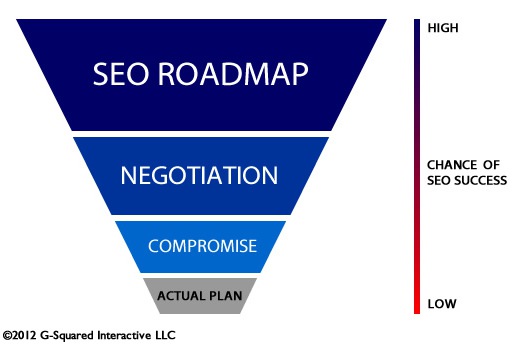
As an SEO, you must ask yourself if you’re ready to fight for SEO, question those who need to be questioned, and drive your project forward. Yes, it’s uncomfortable, and you might be risking your job (especially at larger organizations), but it’s the right thing to do if you want to drive change. Looking back at my time before running G-Squared Interactive, some of my most successful projects were because I drove changes through. If I didn’t rub some people the wrong way, those projects would have failed, guaranteed. So, be tough, fight for SEO, and drive forward. That’s what a SEAL would do.
5. Never Give Up
Dave: Perhaps the most important psychological commitments we make to one another as SEALs is an unsaid rule that we will never quit on each other unless we’re dead. This phenomenon is tied to a legacy of honor from our past brothers making the ultimate sacrifice. The SEAL Teams, and most other Special Operations units, are bound together by this unspoken devotion. Knowing my brother will die for me, and I for him, fuels our success on and off the battlefield.
Glenn: When you take on an SEO project, are you absolutely determined to succeed? Are you ready to bend over backwards to help your client or company win? Although there are no guarantees in SEO, I feel as if you need to understand that success is possible in order to achieve it. SEO results can take a long time to build. Changes implemented now could take months to bring strong results. During that time, you might be pushed to give up, change direction, etc. That push could be from clients, cross-functional teams, executives, etc. It’s ok to adapt based on changes in the environment, but don’t give up on SEO. You need to have the confidence to know your actions will lead to results.
In SEO, strategies on paper mean nothing. Speed to implementation means everything. Rankings, traffic, and conversion can’t possibly increase if you don’t drive forward and implement changes. Make sure everyone on your team is aligned and moving in the right direction. Never quit on each other, deal with the problems you encounter along the way (whether project or people-based), and work to win. That’s what a SEAL would do.
The Importance of Driving Forward When Facing SEO Obstacles

6. Using Technology to Enhance a SEAL’s Efforts
Dave: Technology is a tool like any weapon, radio, or rucksack. If used properly and effectively it can give you and your team the advantage over your enemy. If used improperly it can be the distraction that inhibits your operational success. That is why SEALs spend so much time training with new technology. But, it’s important to remember that there is a human being behind the technology that makes it so effective in combat, and never the other way around.
Glenn: Did anyone else just nod in absolute agreement? There are so many tools and applications at an SEO’s disposal that I think too many people believe that technology alone can lead to success. Don’t get me wrong, many of those tools are extremely helpful in collecting the necessary intelligence in order to perform. For example, using technology to diagnose technical problems, perform competitive intelligence, better understand users, the keywords they are searching for, how well users convert, tracking down inbound links, finding important social interactions, etc.
But as Dave said, it’s critical to understand the importance of the person using that information to analyze a given situation. Data is just data. But smart SEO analysis is hard to come by, and that’s what will make a huge difference. Don’t get yourself into a situation where you have so many tools that you essentially get bogged down, with too much data, with no ability to act on the data. Used correctly, SEO’s can benefit greatly from tools and technology, but used incorrectly or without the proper analysis, the technology could inhibit success. Don’t let that happen.
Tools Are Important, but Smart SEO Analysis is Critically Important
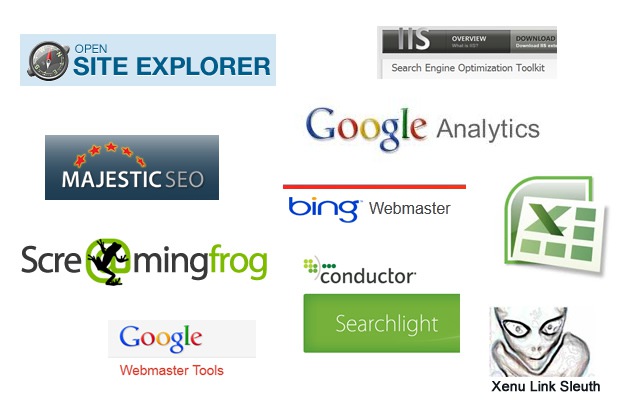
7. The Importance of Small, Targeted, and Stealthy teams
Dave: It is critical to embrace the fact that your enemy is training RIGHT NOW! They are doing everything they can do to destroy your existence. They want to remove you and your team from the equation. The “frontal assault” is a concept of the past. Small, stealthy units who operate on the fringe of consciousness will always maintain the upper hand, simply because nobody sees them coming. It’s the brash and bravado that always ruin the surprise, which can get people killed.
Glenn: I’ve noticed something related to small stealthy teams in SEO for some time now. In order to succeed, organizations need the right teams working on their initiatives, based on the complexity of the projects at hand. The “right team” can mean different things for each organization, but in my opinion, small, laser-focused SEO teams can provide incredible value for companies looking to succeed. That can mean a “special operations” SEO team working internally at an organization, or externally at an agency or consultancy.
SEAL Teams are Small and Stealthy. Raw Numbers Don’t Make up for Expertise
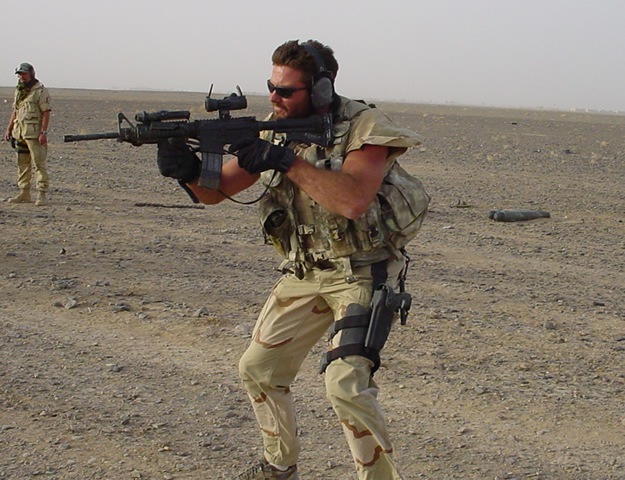
I remember one incredibly tough SEO project where I had a team of just 4 people crank out more tangible work than a typical team of 20 would have. We succeeded in changing the overall SEO strategy for a large organization, and implementing several of the core changes within a four month period. We had a huge impact. We were like a special operations team, less the guns, guts, and danger. 🙂
Summary – Think Like a SEAL
I hope you found this post about applying SEAL philosophy to SEO helpful. This is by no means an exhaustive list of how SEAL thinking could help us succeed as marketers. That said, the core points that Dave brings up directly relate to what we do every day as SEO’s. I recommend speaking with your teams about the bullets above, try and improve how you work as a team, and see how close you can get to Special Operations SEO. I plan to write more posts with Dave in the future, so this isn’t the last time I’ll be talking about Navy SEALs and SEO.
Again, I want to thank Dave for taking the time out of his busy schedule to help me with this post. And I think I speak for all of us in SEO when I thank him for his service as a SEAL. It’s because of people like Dave that I’m able to help companies with digital marketing, SEO, etc. It’s easy to take that for granted, but we should never do that. Ever.
Image Credit:
Dave Rutherford / FrogLogic Concepts
Alexander Novikov / iStockPhoto




![AI Overviews: We Reverse-Engineered Them So You Don't Have To [+ What You Need To Do Next]](https://www.searchenginejournal.com/wp-content/uploads/2025/04/sidebar1x-455.png)